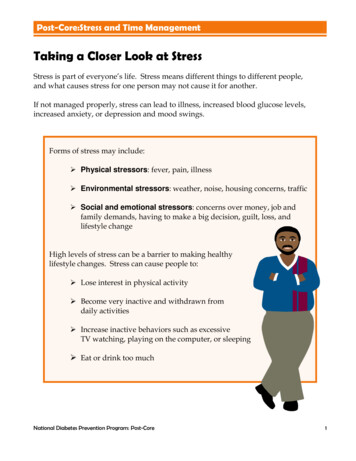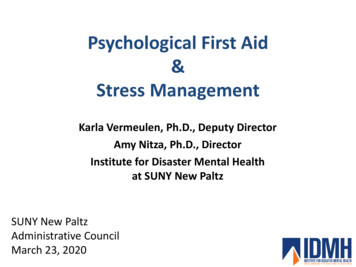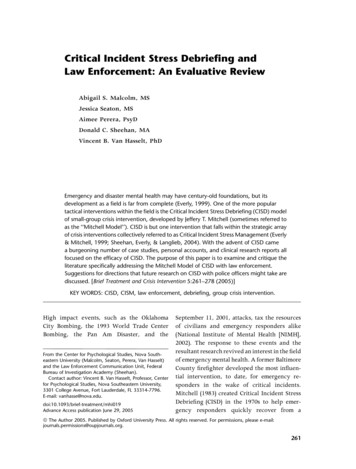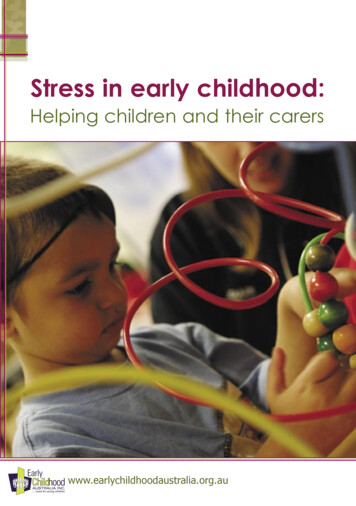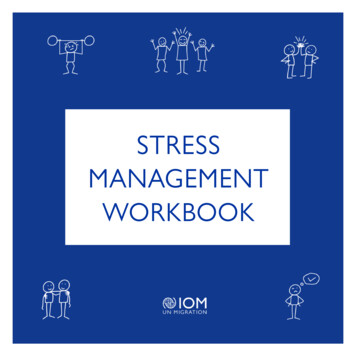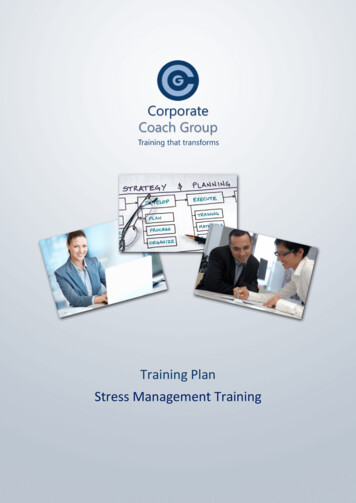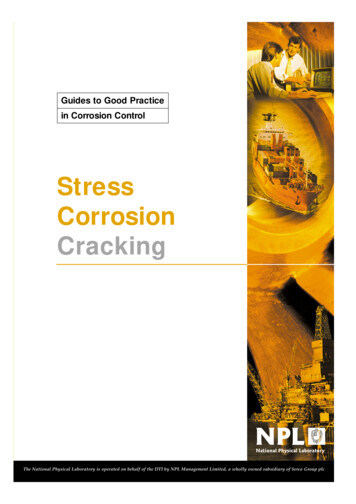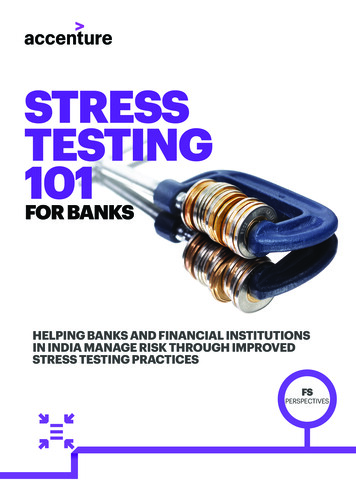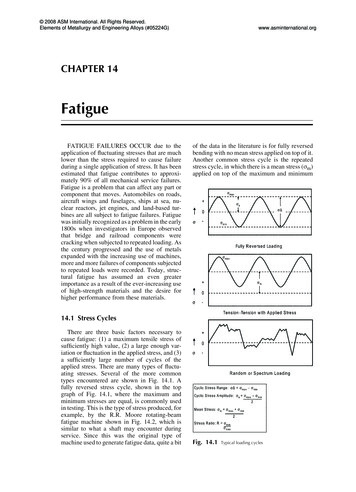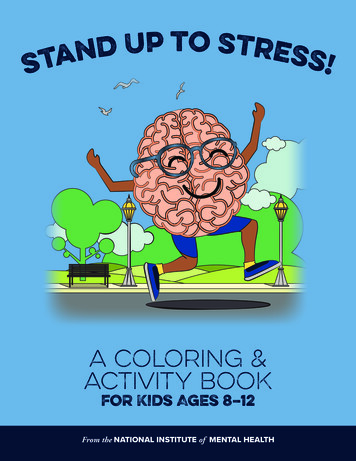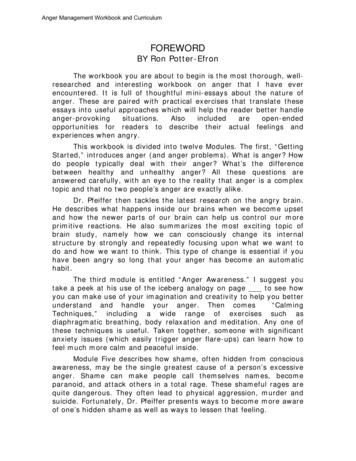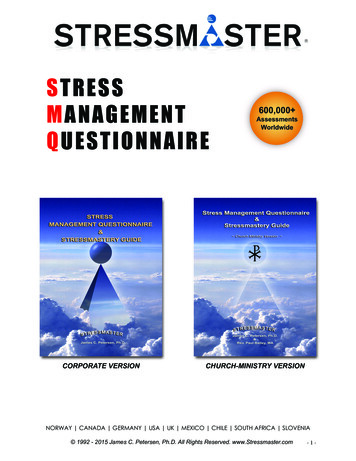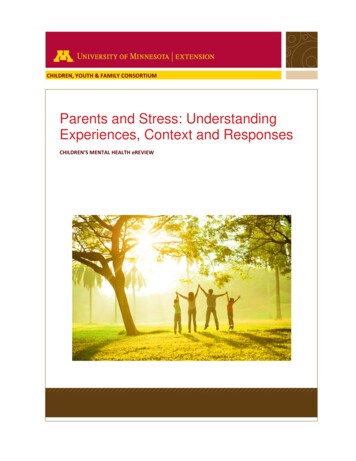
Transcription
CHILDREN,YOUTH&FAMILYCONSORTIUMParents and Stress: UnderstandingExperiences, Context and ResponsesCHILDREN’SMENTALHEALTHeREVIEW
Parents and Stress: UnderstandingExperiences, Context and y.May2015Authors:Sarah Cronin, M.A., Doctoral Student, Educational Psychology, University Of MinnesotaEmily H. Becher, Ph.D., Extension Center for Family DevelopmentKris Schmiesing Christians, MS, CCC, St. Paul Public SchoolsMary Maher, MSW, LPEStephanie Dibb, MSW, LGSW, Greater Minneapolis Crisis NurseryEditor:Trudy Dunham, M.S., Extension Center for Youth DevelopmentSara Langworthy, Ph.D., Extension Children, Youth & Family ConsortiumCari Michaels, M.P.H., Extension Children, Youth & Family ConsortiumKjersti Olson, Ph.D., Extension Center for Family DevelopmentSharon Powell, Ph.D., Extension Center for Family DevelopmentMary Vitcenda, B.A., Extension Center for Family DevelopmentDesignJessica Barnes, Extension Center for Family DevelopmentEvaluate this eReviewhttp://z.umn.edu/evaluatethisissueEditorial Information:Children, Youth & Family Consortium475 Coffey Hall1420 Eckles AvenueSt. Paul, MN 55108www.extension.umn.edu/family/cyfcFacebook: UofMNCYFCTwitter: @CYFCumnYouTube: UofMNCYFC tensionStoreat800- ‐876- SMENTALHEALTHeREVIEW:PARENTALSTRESS1
Editor’sCommentsSince 2009, the Children, Youth & Family Consortium has engaged researchers and practitioners inbringing published research and creative practice ideas to children’s mental health professionals. TheChildren’s Mental Health eReview addresses the gap between what we know from the literature and whatwe experience working with children and families. Each issue explores a specific topic area and reflects theexpertise of a group of people working in diverse research and practice settings.This issue explores the types of stress experienced by parents, both as a response to the demands of theirparenting role and due to their social and environmental circumstances. Particular attention is paid to theexperiences of parents facing economic hardship. This issue includes a model for understanding stress andspecific suggestions for helping parents cope. Many authors and editors have contributed variedperspectives, knowledge, and recommendations for future work in this field. The eReview productionprocess gives voice to both researchers and practitioners who have expertise with a variety of populations,settings and cultures. View other Children’s Mental Health eReview issues on topics relevant for children, youth and familiesat the University of Minnesota Extension Children, Youth & Family c Learn about parenting, personal finance and other issues facing families at the University ofMinnesota Center for Family Development: http://www.extension.umn.edu/family/ Learn about positive, out-of-school time, non-formal learning opportunities for young people at theUniversity of Minnesota Center for Youth Development: http://www.extension.umn.edu/youth/ Learn about community leadership, economics, and engagement at the University of Minnesota Centerfor Community Vitality: SMENTALHEALTHeREVIEW:PARENTALSTRESS2
RESEARCHSUMMARYSarah Cronin, M.A.Doctoral StudentEducational PsychologyUniversity Of Minnesotastress promote longevity (Epel & Lithgow, 2014).However, too much stress can lead to physical,emotional, and mental health risks for problemssuch as migraine headaches, relationship issues, orsubstance use disorders (Patnaik, 2014).Emily H. Becher, Ph.D.Research FellowUniversity Of Minnesota Extension Center forFamily tress is an inevitable, normal experience that isfelt when an individual is unsure if she can meetthe demands of her environment (Patnaik, 2014).Depending on the context, stress can be one ofthree things: 1) positive and conducive to healthydevelopment, 2) simply tolerable with no strongeffects, or 3) toxic and conducive to physical,emotional, and mental impairment (Center on theDeveloping Child, 2015). It is important to notethat “stress” is defined not necessarily by anindividual’s experience, but by her behavioral,emotional, cognitive, biological and interpersonalresponses to that experience. This response candiffer from person to person, so an exploration ofstress requires examining both the causes of andresponses to situations experienced as stressful bythe individual. This review explores these causesand responses as experienced by parents — withparticular attention to the significant influence ofeconomic hardship.In general, stress can be defined as “a negativeemotional experience accompanied by predictablebiochemical, physiological, cognitive, andbehavioral changes that are directed either towardsaltering the stressful event or accommodating toits effects” (Patnaik, 2014; Baum, 1990). However,while stress is generally defined as a negativeemotional experience, in small amounts it can bepositively associated with more responsiveparenting habits, such as displaying positivefeelings towards children (Newland, Crnic, Cox, &Mills-Koonce, 2013). Likewise, small amounts though the terms “parental stress” and“parenting stress” are often used interchangeably,this review makes a distinction. First, we define“parenting stress” as stress that is felt in responseto the demands of being a parent — stress that isoften experienced as negative feelings toward theself and toward the child or children. By definitionthese negative feelings are directly attributable tothe demands of parenthood (Deater-Deckard,1998). For example, parents can experience stressbecause of the immediate demands of meeting achild’s needs (food, comfort, attention), the need tobalance a child’s needs with their own needs, andthe general social pressure associated with a longterm investment in the child’s growth and wellbeing.Second, we define “parental stress” as stress thatparents experience not only because of childrearing, but also due to their social andenvironmental circumstances, responsibilities, andeveryday life. The term “parental stress”acknowledges that there is a greater context for thestress parents experience (Belsky, 1984).The presence or absence of social support andeconomic challenges and other factors impactsstress for parents and non-parents alike, but forparents there are added stressors such as child3
characteristics and parenting responsibilities thatinfluence well-being in general, and parents’ mentalhealth in particular (Belsky, 1984, p. 86). Beyondindividual characteristics such as age, gender, andphysical health, there are ecological and contextualfactors, including geographical location, socioeconomic status, race, and ethnicity that impact thelevel of stress and threaten the physical and mentalhealth of parents (Beeber, et al., 2014; Epel &Lithgow, 2014; Berger & Guidroz, 2009; Kotelchuck,2006). Add social circumstances such asneighborhood violence and housing instability, andparental stress can quickly increase (VernonFeagans, Garrett-Paters, Willoughby, & Mill-Koonce,2012).In recent years, many families have experiencedincreased economic stress due to the GreatRecession. Several researchers found that parentswho experience greater economic stress alsoexperience greater parenting stress (Leininger &Kalil, 2014; Sturge-Apple, Suor, & Skibo, 2014;Santiago, et al., 2012; Kotelchuck, 2006). Forinstance, mothers experiencing substantialeconomic stressors show an increased inclinationto label their child’s misbehavior as intentionallytrying to annoy, anger, or embarrass them (SturgeApple, Suor, & Skibo, 2014). In another example,parents with greater economic stress may be morelikely to interpret their child refusing to put awaytoys as an intentional act to annoy them ratherthan the child’s interest in continued play.Economic stress impacts not only the parent, butalso the child directly, as it has been shown ntribute to harsh discipline (Sturge-Apple, Suor,& Skibo, 2014) and an increased risk of childmaltreatment (Tucker & Rodriguez, 2014; BrooksGunn, Schneider, & Waldfogel, 2013). Keep in mind,however, that economic hardship alone does notlead to child maltreatment — it is possible thatvariables such as higher parent education levelloosens the connection between economic hardshipand harsh discipline or child maltreatment.However, one research study did find thatindependent of parent educational attainment,economic hardship was linked with harsherdiscipline (Juby, 2009).Despite these examples of the negative influence ofeconomic pressure on parent and child well-being,this same pressure has also been shown to increasesymptoms of anxiety that are positively associatedwith more sensitive parenting (Newland, Crnic, Cox,& Mills-Koonce, 2013). That is, mothers whoreported greater anxiety related to economic stressalso practiced parenting that was responsive andemotionally involved, and they displayed positivefeelings toward their children (Newland, Crnic, Cox,& Mills-Koonce, 2013). Anxiety symptoms alone(without other comorbid psychological symptomssuch as depression) may create enough vigilanceand sensitivity for a parent to meet the child’sneeds. Someone who is worried about meetingtheir economic responsibilities may also be inclinedto worry about other responsibilities, such asparenting. Overall, even though economic pressurecan have varying effects on parenting, minoranxiety related to economic stress is associatedwith sensitive, responsive ceofeconomicpressureonparentandchildwell- oresensitivep arenting.4
acculturation, discrimination, and immigration(Cervantes et al., 2014). ). Cross-cultural differencesLazarus (1993) describes a classic stress model thatwere also observed between Korean and Americanoutlines the experience of stress. The modelmothers. Korean mothers reported greateridentifies four distinct aspects of parental stress,parenting stress, yet experienced lower childeach of which is described with an example in thebehavior problems than American mothers;following graphic:however, the American mothers associated theirLazarus’StressModelThe Agent ofStress The person orthing thatinstigatesstress. A childwhining for apiece of candy.The Appraisalof Stress How a parentinterpretes thestress (canrange frompostive tonegative). "My child isbehaving thisway becauseshe's tired."Agent of Stress – Agents of stress can be anything aparent perceives as a demand that is difficult tomeet (Patnaik, 2014). Balancing time between workand family, health care bills, transportation issues,and expectations of others are all agents that cancause stress in parents. Health factors such ashaving a child with special needs (Ammari, Morris,& Schoenebeck, 2014), autism (Hastings et al.,2005), developmental disabilities (Woodman,Mawdsley, & Hauser-Cram, 2014) or chronic illness(Eccleston et al., 2012) can add to financial strainand parental stress.Economic demands can also be agents of stress(Ponnet, Leeuwen, & Wouters, 2014; Wadsworth etal., 2013). Financial disagreements have beenassociated with divorce (Dew, Britt, & Huston,2012), and divorce alone has been shown toincrease parental stress (Kulick & Heine-Cohen,2011). Most parents consistently experiencemultiple agents of stress in their lives. Some agentsof stress are more salient within specific cultures.For example, when inquiring about agents of stressin Hispanic adolescents, researchers identifiedunique culturally related stressors related pingMechanisms How a parentcopes with thebehavior. Deciding tospeak directlywith the childaboutexhibitedbehavior andexpectedbehavior.The StressReaction How a parentreacts in themoment. "I know you'retired but Ineed you to bepatient."parenting stress with their child’s behavior morethan Korean mothers (Chung et al., 2013).Appraisal of Stress — Parents vary widely in theirevaluation of stressful events, depending onvariables in the environment and within the person.“People are selective both in what they payattention to and in what their appraisals take intoaccount” (Lazarus, 1993, p. 7). For example, if amother was expecting a higher energy bill becauseshe turned up the heat in the winter, she mayevaluate the stress of seeing a high bill asmanageable. However, if she did not expect thehigher energy bill, she may evaluate it asoverwhelming and stressful.Accessibility to socio-economic resources andeconomic strain have been linked to the appraisalof stress (Leininger & Kalil, 2014; Kulick & HeineCohen, 2011). Mothers who recently experienceddivorce perceive their situation as more stressful ifthey have fewer social and economic resources anda lower level of education compared to motherswith more socio-economic resources and education(Kulick & Heine-Cohen, 2011). Leininger and Kalil(2014) discuss evidence that feelings of economic5
strain may come not from major events such aslosing a job as much as how one appraises thoseevents. For example, persistent worry anduncertainty about the future leads one to feel moreeconomic strain than income loss alone (Leininger& Kalil, 2014).The appraisal ofstress may alsodiffer by racialand ethnicgroups. Forexample, onestudy showedthat economicstrain, definedas a parent’ssubjectiveevaluation ofcurrent financialstatus(Voydanoff,1990), wassignificantlyassociated withincreased behavior problems for white children,but not for black children (Leininger & Kalil, 2014).These results were present even when economicexperiences and family psychosocial factors weretaken into account (Leininger & Kalil, 2014).It’s important to note that some coping behaviorscan be adaptive in some circumstances andmaladaptive in others. For example, avoiding thesource of stress could be adaptive whenexperiencing partner abuse, yet avoiding parentingresponsibilities when overwhelmed could bemaladaptive. Lee and Mason (2014) observedcultural differences in coping between KoreanAmericans and Caucasian Americans. AlthoughKorean-Americans showed more avoidant copingstrategies than Caucasian-Americans, they alsodisplayed more problem and emotion-focusedcoping than Caucasians. Coping strategies matterin parenting, and are discussed at greater lengthlater in this review.Stress Reaction — The process of experiencing astressful event, evaluating that event, and choosinga coping mechanism usually happens very quickly,resulting in a stress reaction from the parent.Stress reactions are both what a person feels andhow that person acts in response to the stressfulevent. The stress reaction is where copingbehaviors are deployed. Behavioral responses tostress can range from taking a deep breath, takinga small break from a situation, yelling, usingphysical aggression, using substances, etc. Thebehavior someone exhibits in response to stressimpacts the way they feel both in the moment andin the future. For example, adaptive copingstrategies can lead to positive emotional reactionsCoping Mechanisms — The appraisal of stressand lower blood pressure (Maier et al., 2003), whileinfluences which coping mechanism(s) a parent willsome maladaptive coping strategies have beenuse. Appraising a circumstance as tolerable canassociated with headaches and increased substancepromote adaptive coping, while appraising ause (Patnaik, 2014). Stress reactions not onlysituation as overwhelming may lead to maladaptiveimpact the way a parent acts and feels in acoping. Parents have a range of adaptive andsituation, but also can have further implications inmaladaptive coping mechanisms. Examples ofa parent’s life. For example, when adults experienceadaptive coping mechanisms include problemconflict about finances and react by yelling, eyesolving, emotional regulation, and seeking of socialrolling, and other negative actions, the likelihood ofsupport. Examples of maladaptive copingdivorce increases compared to couples whomechanisms include avoiding the source of stressaddress conflict with calm discussion. (Dew, Britt, &(for example, through substance abuse), orHuston, 2012).dissociating in such a way that leads to furtherstress (for example, leaving a situation whereparental guidance is RESS6
StressAffectstheParent,StressAffectstheChildThe daily demands of parenting can be alternatelyfilled with moments of joy and happiness, as wellas frustration and irritation. For parents of youngchildren, challenging moments can arise aroundbedtimes and mealtimes, and may involve a varietyof behaviors and feelings. For example, parentsmay nag their children and feel overwhelmed byhousehold tasks, lack of “me” time, and lack ofprivacy, while children may whine or engage inpublic displays of inappropriate behaviors (Crnic &Low, 2002). For parents of older children,challenges can be related to curfew, dating,difficult attitudes, technology use, and substanceuse (Smetana & Rote, 2014). While each event byitself could be considered minor, it is theaccumulation of events over time experiencedalong with other sources of life stress, such asunemployment and relationship discord, that canresult in considerable stress for parents (Riley,Scaramella, McGoron, 2014). This is cumulativestress, i.e., the accumulation of stressors thatnegatively affect individuals, rather than oneindependent stressful experience (Morales &Guerra, 2006).these independent stressors accumulate and take atoll on the parent. Supporting parents in any stepof the Lazarus model to help them manage agentsof stress, appraisal of stress, coping mechanisms,and stress reactions can have a positive impact onthe child. For a more complete discussion abouthow people cope with difficult events, see theAmerican Psychological Association’s “The Road toResilience” (American Psychological Association,2015).Parents living in social contexts with greater stressare more vulnerable to the negative effects ofparenting stress, particularly on their parentingpractices. This, of course, affects their children. Inone study, the greater the stress parents reportedfrom financial setbacks, the more likely theirchildren exhibited internalizing problems, such asanxiety or depression. Interestingly, this samestudy found that the more negative economicevents parents experienced, the more their childrendisplayed externalizing problems such asaggression (Puff & Renk, 2014). These findingssuggest that economic context, stress of the parent,and child well-being are important to considercollectively.Parents and children experience the effects ofeconomic stress in different ways depending on aItistheaccumulationofeventsovertimeparent’s socio-economic status. ifestress,it’s been shown that low-income familiesexperience financial stressors at a higher level e- and high-income families (Ponnet, Personal financial stress has been shown to relateto anxiety and depression symptoms (Stein et al.,The accumulation of stressors can lead to greater2011), which in turn increases parent conflict anddifficulties for parents and children (Appleyard,adversely affects child emotional, cognitive,Egeland, vanDulmen, & Sroufe, 2005; Sameroff,behavioral, and physical well-being (Conger,2000). Morales and Guerra (2006) discovered thatConger, & Martin, 2010). The way parents respondcumulative stress over time was related toto stress can also weaken the association betweendecreased academic achievement and increasedfinancial strain and problem behaviors in childrensymptoms of depression among children. Similar(Ponnet, Leeuwen, & Wouters, 2014). When parentseffects have been found for adults — cumulativeare able to show warmth and monitor theirstress is related to increased instances of mentaldisorders in adults (Sameroff, 2000). A parent may children, i.e., display affection and keep track ofbe able to cope with small independent stressors of their children’s whereabouts and activities,an overbearing boss, relationship conflict, financial children’s negative behavior tends to improve evenresponsibilities, and child behavior problems, yetCHILDREN’SMENTALHEALTHeREVIEW:PARENTALSTRESS7
in the context of economic deprivation (Ponnet,Leeuwen, & Wouters, 2014; Odgers et al., roblembehaviors.Researchers also have examined how financialstress and parenting intersect for families withadolescents (Hardaway & Cornelius, 2014, Ponnet,Leeuwen, & Wouters, 2014; Ponnet et al., 2013).Economic hardship can increase maternalpsychological distress, which can negatively affectparenting of adolescents through actions such asattempts to exert more control over theadolescent’s behavior (Hardaway & Cornelius,2014). Less optimal parenting methods, such asharsh or arbitrary discipline, are associated with anincrease in problem behaviors like drinking inadolescents (Ponnet, Leeuwen, & Wouters, 2014;Ponnet et al., 2013). Herein starts a cycle: Financialstrain can lead to less optimal parenting practices,which are associated with an increase in childproblem behaviors (Ponnet, Leeuwen, & Wouters,2014; Ponnet et al., 2013), which in turn increasethe parent’s experiences of stress. Woodman,Mawdsley, and Hauser-Cram’s research (2014)supports this cycle. The authors explain how childconduct problems can contribute to elevatedparenting stress, and in turn, greater stress cancontribute to increased child behavior problems.Rather than addressing the child’s behavior orparenting practices alone, this cycle could beinterrupted by addressing the contextual situationin which both arise.ParentalStressandCopingStrategiesParents practice various coping strategies inresponse to stress. Coping strategies can beconsidered adaptive or maladaptive (that is,healthy or unhealthy), but as already stated, thisassessment depends on the situation. Examples ofcoping strategies generally considered to bemaladaptive include self-blame, substance abuse,avoidance, and denial (Friedman & Billick, SHastings et al., 2005; Carver et al., 1989). Thesemaladaptive coping strategies can adversely affectboth parent and child and have been shown toincrease feelings of depression in the parent(Patnaik, 2014), as well as greatly increase the oddsof child neglect (Friedman & Billick, 2014). Thegreater and more chronic the economic stress afamily experiences, the more likely it is that itsmembers will engage in maladaptive copingstrategies (Brooks-Gunn, Schneider, & Waldfogel,2013). Children can model the behavior of parents,and they can be affected both through directexposure to economic stress and indirectly throughparents’ response to stress (Barnfather & Ronis,2000).Parents can also cope with stress in adaptive ways.For example, Hastings and his colleagues (2005)discovered positive coping strategies to beassociated with lower levels of depression inparents of children with autism. Coping strategiesassociated with reduced stress for parents areorganized into two categories: primary controlcoping and secondary control coping (Band &Weisz, 1990). Primary control coping includesintentional efforts to manage a stressfulsituation — efforts such as problem solving, takinga deep breath, and managing difficult emotions,i.e., emotional regulation. Parents who useproblem-solving skills experience less parentalstress (Bushman & Peacock, 2010). For example, aparent who lists her financial obligations for theupcoming month in order of due date or priorityprobably feels clearer about which obligations arenecessities and which are less needed.Secondary control coping involves adapting oneselfto a stressful situation through means such asacceptance, cognitive restructuring, and positivethinking (Band & Weisz, 1990). Examples ofsecondary control coping strategies includeidentifying something good in a situation,reframing a stressful event to seem more positive,and seeking comfort or understanding from others(Carver et al., 1989). To illustrate reframing: Whena child is crying more than usual, a parent mightconsider how tired the child is instead of labeling8
the crying as annoying or bothersome. In anotherexample of reframing, single African-Americanmothers who are more optimistic displayed lowerlevels of depression and anxiety, which mitigatedthe impact of economic stress for both the parentand children (Taylor et al., 2010). Hastings et al.(2005) conclude that “there is gathering evidencethat the use of positive reframing of potentiallytraumatic and stressful events may be one of theonly effective coping strategies under extremeconditions where it is very difficult to act directlyto reduce the impact of the stressor” (p. 386).Overall, influencing in a positive way any of thefour aspects of stress depicted in the Lazarusmodel can lead to positive outcomes for families.The research suggests that parental stress,especially stress related to economic hardship,impacts the entire family. Supporting parents andtheir children in the appraisal of and reactions tostress can support development of positive copingskills by both parents and children. Some effectiveintervention strategies noted in the research thatpromote development of healthy coping skillsinclude: Teaching healthy parenting practices – Parenteducation programs teach healthy parentingpractices while also providing connections toother parents and building community. Parenteducation has been shown to increase positiveparenting skills, such as providing structure forchildren and supporting child autonomy, anddecrease internalizing problems, such asdepression and anxiety, as well as externalizingproblems, such as lying (Joussement, Mageau, &Koestner, 2014). Gardner, Burton, and Klimes(2006) observed that parent educationinterventions can reduce child conductproblems.Teaching specific coping strategies – Healthyparenting coping strategies are associated withpositive social skills in children (Bushman &Peacock, 2010). Wadsworth and her colleagues(2013) illustrated that primary control copingand secondary control coping reduced egative effects of economic strain on parentalbehaviors. Healthy coping reduced parentaldepressive symptoms and negative parent-childinteractions, which together decreased childinternalizing and externalizing problems(Wadsworth et al., 2013). Treating the family as a unit – Kiser andcolleagues (2015) treated families who hadexperienced trauma, and found that teachingpositive coping strategies to both parents andchildren decreased child post-traumatic stresssymptoms and increased adaptive familyfunctioning. After learning stress managementand communication skills, parents reported adecrease in parenting stress and difficult childbehavior, such as depressive symptoms orlying. By working with all members of a familyand treating the family as a unit, a significantdecrease in stress for the parents and thechildren can be achieved (Kiser et al., 2015). Changing the contextual factors – Every parenthas an individual context that impacts his orher agents and appraisals of stress, copingmechanisms, and reactions to stress. Asdiscussed, contextual factors such as economichardship impact people’s experience of stress(Beeber, et al., 2014; Epel & Lithgow, 2014;Berger & Guidroz, 2009; Kotelchuck, 2006). Notonly can cultural and ethnic componentsimpact the agents of stress (Cervantes et al.,2014) and appraisals of stress (Leininger &Kalil, 2014), they are integrated throughout aperson’s life experience. Thus, attending to theculture and contextual setting in which parentsare living and parenting is critical forsuccessful interventions.9
IMPLICATIONSFORPRACTICEANDPOLICYKris Schmiesing Christians, MS, CCCSpeech-Language Pathologist, St. Paul PublicSchoolsAs a special education professional in a large,urban school district, I found the researchdescribing parental stress as it relates to childoutcomes to mirror my experience of “educatorstress” and its consequences in important ways.The cycle of heightened stress leading to negativereactions to children’s needs, in turn leading tonegative behavior in children seems to exist ineducator-student interactions as well. Just as thisresearch describes parents experiencing children assources of stress due to demands that children, aswell as broader society, place on them, I seeeducators experiencing significant stress based ondemands inherent in classroom management aswell as pressures placed on schools by the broadersociety regarding educational outcomes.can potentially be problematic for children’seducational outcomes when educators, understress to increase student performance, find aneasy explanation for low performance in parentalstress.If research leads us to believe that the children offamilies experiencing stress related to economic orother hardship are not likely to achieve or behavewell, it may lead to decreased expectations of achild’s potential to succeed in school and in life.When children experience academic difficulty orexhibit challenging behaviors at school, anassumption that their difficulties might in
Cari Michaels, M.P.H., Extension Children, Youth & Family Consortium Kjersti Olson, Ph.D., Extension Center for Family Development Sharon Powell, Ph.D., Extension Center for Family Development Mary Vitcenda, B.A., Extension Center for Family Development Design Jessica Barnes, Extension Center for Family Development Evaluate this eReview
